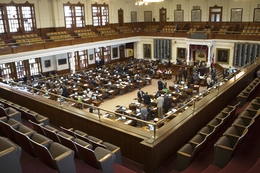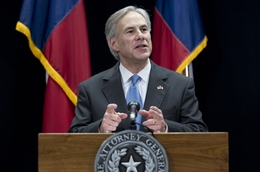
The Road to Victory?
Now that the campaign filing deadline has passed, dozens of candidates are breathing a collective sigh of relief — either because they won’t have to run at all, or because they’re facing a cakewalk. Thirty-five candidates are unopposed in both their primary and general elections, including 28 in the Texas House and seven in the state Senate. One of the unopposed state House candidates — former State Board of Education member Marsha Farney — will come in as a freshman. There are no unopposed candidates in Texas' congressional delegation, though several of them have what look like easy races.
Here’s a look at the outright winners, and those who appear to be cruising toward victory, in Texas’ congressional and legislative races. Candidates listed as "Opposed - Looking Good" face no primary challenger, and are either running in a district where their party won the 2010 election by a margin of more than 20 points, or have no major party opposition in the general election.
| Candidates Who Are Unopposed or Likely to Win | |||
|---|---|---|---|
| District | Candidate | Party | Status |
| CD-1 | Louie Gohmert | Republican | Opposed - Looking Good |
| CD-2 | Ted Poe | Republican | Opposed - Looking Good |
| CD-5 | Jeb Hensarling | Republican | Opposed - Looking Good |
| CD-17 | Bill Flores | Republican | Opposed - Looking Good |
| CD-18 | Sheila Jackson Lee | Democrat | Opposed - Looking Good |
| CD-19 | Randy Neugebauer | Republican | Opposed - Looking Good |
| CD-20 | Joaquin Castro | Democrat | Opposed - Looking Good |
| CD-26 | Michael Burgess | Republican | Opposed - Looking Good |
| CD-29 | Gene Green | Democrat | Opposed - Looking Good |
| CD-32 | Pete Sessions | Republican | Opposed - Looking Good |
| SD-2 | Bob Deuell | Republican | Unopposed - Winner |
| SD-13 | Rodney Ellis | Democrat | Unopposed - Winner |
| SD-18 | Glenn Hegar | Republican | Unopposed - Winner |
| SD-23 | Royce West | Democrat | Unopposed - Winner |
| SD-24 | Troy Fraser | Republican | Unopposed - Winner |
| SD-27 | Eddie Lucio Jr. | Democrat | Unopposed - Winner |
| SD-29 | Jose Rodriguez | Democrat | Unopposed - Winner |
| SD-1 | Kevin Eltife | Republican | Opposed - Looking Good |
| SD-6 | Mario Gallegos | Democrat | Opposed - Looking Good |
| SD-8 | Ken Paxton | Republican | Opposed - Looking Good |
| SD-12 | Jane Nelson | Republican | Opposed - Looking Good |
| SD-16 | John Carona | Republican | Opposed - Looking Good |
| SD-17 | Joan Huffman | Republican | Opposed - Looking Good |
| SD-22 | Brian Birdwell | Republican | Opposed - Looking Good |
| HD-13 | Lois Kolkhorst | Republican | Unopposed - Winner |
| HD-16 | Brandon Creighton | Republican | Unopposed - Winner |
| HD-20 | Marsha Farney | Republican | Unopposed - Winner |
| HD-22 | Joe Deshotel | Democrat | Unopposed - Winner |
| HD-25 | Dennis Bonnen | Republican | Unopposed - Winner |
| HD-28 | John Zerwas | Republican | Unopposed - Winner |
| HD-32 | Todd Hunter | Republican | Unopposed - Winner |
| HD-36 | Sergio Munoz | Democrat | Unopposed - Winner |
| HD-42 | Richard Raymond | Democrat | Unopposed - Winner |
| HD-44 | John Kuempel | Republican | Unopposed - Winner |
| HD-50 | Mark Strama | Democrat | Unopposed - Winner |
| HD-58 | Rob Orr | Republican | Unopposed - Winner |
| HD-66 | Van Taylor | Republican | Unopposed - Winner |
| HD-71 | Susan King | Republican | Unopposed - Winner |
| HD-72 | Drew Darby | Republican | Unopposed - Winner |
| HD-76 | Naomi Gonzalez | Democrat | Unopposed - Winner |
| HD-81 | Tryon Lewis | Republican | Unopposed - Winner |
| HD-82 | Tom Craddick | Republican | Unopposed - Winner |
| HD-86 | John Smithee | Republican | Unopposed - Winner |
| HD-100 | Eric Johnson | Democrat | Unopposed - Winner |
| HD-103 | Rafael Anchia | Democrat | Unopposed - Winner |
| HD-104 | Roberto Alonzo | Democrat | Unopposed - Winner |
| HD-111 | Yvonne Davis | Democrat | Unopposed - Winner |
| HD-112 | Angie Chen Button | Republican | Unopposed - Winner |
| HD-126 | Patricia Harless | Republican | Unopposed - Winner |
| HD-140 | Armando Walle | Democrat | Unopposed - Winner |
| HD-142 | Harold Dutton | Democrat | Unopposed - Winner |
| HD-145 | Carol Alvarado | Democrat | Unopposed - Winner |
| HD-1 | George Lavender | Republican | Opposed - Looking Good |
| HD-38 | Eddie Lucio III | Democrat | Opposed - Looking Good |
| HD-46 | Dawnna Dukes | Democrat | Opposed - Looking Good |
| HD-49 | Elliott Naishtat | Democrat | Opposed - Looking Good |
| HD-51 | Eddie Rodriguez | Democrat | Opposed - Looking Good |
| HD-60 | Jim Keffer | Republican | Opposed - Looking Good |
| HD-63 | Tan Parker | Republican | Opposed - Looking Good |
| HD-69 | James Frank | Republican | Opposed - Looking Good |
| HD-79 | Joe Pickett | Democrat | Opposed - Looking Good |
| HD-84 | John Frullo | Republican | Opposed - Looking Good |
| HD-89 | Jodie Laubenberg | Republican | Opposed - Looking Good |
| HD-108 | Dan Branch | Republican | Opposed - Looking Good |
| HD-109 | Helen Giddings | Democrat | Opposed - Looking Good |
| HD-113 | Cindy Burkett | Republican | Opposed - Looking Good |
| HD-120 | Ruth McClendon | Democrat | Opposed - Looking Good |
| HD-123 | Mike Villarreal | Democrat | Opposed - Looking Good |
| HD-124 | Jose Menendez | Democrat | Opposed - Looking Good |
| HD-128 | Wayne Smith | Republican | Opposed - Looking Good |
| HD-130 | Allen Fletcher | Republican | Opposed - Looking Good |
| HD-148 | Jessica Farrar | Democrat | Opposed - Looking Good |
| HD-1 | George Lavender | Republican | Opposed - Looking Good |
| HD-14 | John Raney | Republican | Opposed - Looking Good |
| HD-27 | Ron Reynolds | Democrat | Opposed - Looking Good |
| HD-30 | Geanie Morrison | Republican | Opposed - Looking Good |
| HD-61 | Phil King | Republican | Opposed - Looking Good |
| HD-62 | Larry Phillips | Republican | Opposed - Looking Good |
| HD-87 | Walter "Four" Price | Republican | Opposed - Looking Good |
| HD-99 | Charlie Geren | Republican | Opposed - Looking Good |
| HD-116 | Trey Martinez Fischer | Democrat | Opposed - Looking Good |
| HD-122 | Lyle Larson | Republican | Opposed - Looking Good |
| HD-135 | Gary Elkins | Republican | Opposed - Looking Good |
| HD-139 | Sylvester Turner | Democrat | Opposed - Looking Good |
| HD-141 | Senfronia Thompson | Democrat | Opposed - Looking Good |
| HD-143 | Ana Hernandez Luna | Democrat | Opposed - Looking Good |
A Crowded Field
Not all incumbents have an easy path forward. Some are facing hefty primary challenges from a wide range of candidates — increasing the likelihood that they won’t make it to the general without a run-off.
In Congress, U.S. Reps. Joe Barton, R-Ennis; Silvestre Reyes, D-El Paso; and Blake Farenthold, R-Corpus Christi, each have three primary challengers. Ruben Hinojosa, D-Edinburg has four. In the state House, Reps. Jim Pitts, R-Waxahachie, and Jim Landtroop, R-Plainview, each have three primary opponents.
These are the congressional and legislative incumbents facing two or more challengers in their party’s primary.
| Incumbents Facing a Crowded Primary Field | |||
|---|---|---|---|
| District | Incumbent | Party | Primary Opponents |
| CD-3 | Sam Johnson | Republican | 2 |
| CD-6 | Joe Barton | Republican | 3 |
| CD-15 | Ruben Hinojosa | Democrat | 4 |
| CD-16 | Silvestre Reyes | Democrat | 3 |
| CD-21 | Lamar Smith | Republican | 2 |
| CD-27 | Blake Farenthold | Republican | 3 |
| CD-30 | Eddie Bernice Johnson | Democrat | 2 |
| SD-25 | Jeff Wentworth | Republican | 2 |
| HD-10 | Jim Pitts | Republican | 3 |
| HD-11 | Chuck Hopson | Republican | 2 |
| HD-43 | J.M. Lozano | Republican | 2 |
| HD-59 | Sid Miller | Republican | 2 |
| HD-88 | Jim Landtroop | Republican | 3 |
| HD-133 | Jim Murphy | Republican | 2 |
Comeback Kids
In the Texas House, 10 candidates who lost in 2010 are seeking another chance. Some of them were defeated in primaries, others in the general. At least one — former Houston Rep. Al Edwards — is battling the same opponent — current Houston Rep. Borris Miles — for the fourth time. And because of redistricting, some former lawmakers who served alongside one another are now facing off.
Like former Reps. Paula Pierson and Chris Turner, both Arlington-based Democrats who lost their respective races in the 2010 general election. They’re now competing in the Democratic primary for HD-101.
Here are the candidates who are back to the races.
| Candidates Who Lost in 2010, and are Seeking a Comeback | |||
|---|---|---|---|
| District | Candidate | Party | Last Election? |
| HD-7 | Tommy Merritt | Republican | Lost 2010 Republican primary |
| HD-34 | Abel Herrero | Democrat | Lost 2010 general election |
| HD-43 | Yvonne Gonzalez Toureilles | Democrat | Lost 2010 general election |
| HD-83 | Delwin Jones | Republican | Lost 2010 Republican primary |
| HD-78 | Joe Moody | Democrat | Lost 2010 general election |
| HD-85 | Dora Olivo | Democrat | Lost 2010 Democratic primary |
| HD-101 | Paula Pierson | Democrat | Lost 2010 general election |
| HD-101 | Chris Turner | Democrat | Lost 2010 general election |
| HD-107 | Robert Miklos | Democrat | Lost 2010 general election |
| HD-114 | Carol Kent | Democrat | Lost 2010 general election |
| HD-146 | Al Edwards | Democrat | Lost 2010 Democratic primary |
In other campaign-related news...
- Lt. Gov. David Dewhurst's bid for U.S. Senate has received the support of six former Dallas County Republican Party chairmen — every chairman since 1980. Meanwhile, former ESPN analyst Craig James, one of Dewhurst's opponents, has earned the endorsement of former Dallas Cowboys legend Daryl "Moose" Johnston. Johnston had previously endorsed former Dallas Mayor Tom Leppert, yet another Republican candidate in the Senate field.
- James has been busy; he announced this week that he'll be traveling the state in support of Republican presidential candidate and former Pennsylvania Sen. Rick Santorum. The other Republican in the Senate campaign field, Ted Cruz, began airing two radio ads this week, the campaign's first paid media buy.
- State Rep. Rodney Anderson, R-Grand Prairie, has endorsed Rep. Kelly Hancock, R-Fort Worth, in the race for SD-9. Anderson dropped out of that race last week. The other Republican in that primary is Bedford Rep. Todd Smith.
- Fort Worth City Council member Kathleen Hicks, a Democrat, joined the already crowded field for CD-33. That makes 11 Democrats running in that primary, including Fort Worth state Rep. Marc Veasey.
- The Texas and Southwestern Cattle Raisers Association PAC has endorsed Sugar Land businessman Lee Duggan III for HD-85, which includes all of Wharton and Jackson counties and part of Fort Bend County. Whoever wins the Republican primary will face off against former Democratic state Rep. Dora Olivo in the general election. The PAC also endorsed Republican Alan Ritter for HD-21.
- Attorney Jessica Siegel was arrested at the Montgomery County Republican Party headquarters on Friday after filing to run for 418th State District Court Judge. She was charged with a state jail felony for allegedly tampering with a government record — and has been accused of falsifying the length of time that she has lived in the county. She was released on bail, and is still fighting to get back on the ballot.
- In a strange story out of Weslaco, a Democratic candidate for state representative, Joseph Campos, listed a Republican candidate for state representative, Joel De los Santos, as his campaign treasurer. The two candidates also put the same home address on their paperwork. They are running to replace Democratic Weslaco Rep. Armando "Mando" Martinez. De los Santos told the Rio Grande Guardian he has no idea why his name and address are on Campos' filings.
- Comptroller Susan Combs has endorsed Rep. David Simpson, R-Longview, in his race for HD-7. He's facing off against former Republican Rep. Tommy Merritt, whom he defeated in the primary in 2010. She also endorsed Rep. Wayne Christian, R-Center, for HD-9.
- Bob Hall, who filed to run against Sen. Bob Deuell, R-Greenville, but was disqualified over residency questions, told the Tyler Morning Telegraph he is considering legal action to get back on the ballot. But the paper reported there are further residency questions being raised over a vote he cast in a 2008 election in Florida.









